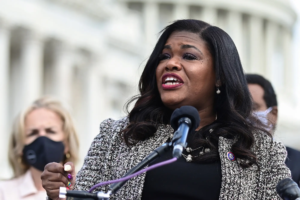Last Friday, November 5, applications for Restorative Housing grants – the first program of the City of Evanston’s so-called reparations commitment – officially closed, and Deputy City Manager Kimberly Richardson said applications for the grants poured in as the deadline approached.
As of November 2 there were 398 applicants, and by November 3 there were 476, Richardson told the City Council’s Reparations Committee on Thursday, November 5. She anticipated that more than 500 would be received by the deadline.
The city’s reparations fund has received $31,410 in donations, Assistant to the City Manager Tasheik Kerr reported Thursday. She said more than 53 people have contributed to the fund.
As previously reported by the Roundtable, the city’s Local Reparations Restorative Housing Program is the first initiative in the city’s $10 million commitment; 4% of the total ($400,000) is being earmarked for housing. Applicants who are deemed eligible and selected may receive up to $25,000 in funds to purchase a home, remodel a home or pay down one’s mortgage. The home must be located in Evanston and must be the applicant’s primary residence.
To be eligible for this program, Black Evanstonians must meet one of three criteria:
- Black residents who lived in the City between 1919 and 1969 (called “ancestors”);
- Direct descendants of a Black resident from the period 1919 to 1969;
- Or they must be able to submit evidence proving housing discrimination due to the City’s policies or practices after 1969.
Debate over adjusting deadlines
At the meeting, the committee debated whether to change the November 11 deadline to approve applications and the November 30 deadline to select applicants to ensure there is sufficient time to process submissions.
Each application must go through a twofold verification process. First, Richardson’s team has to verify the application is complete, then it must determine that the verification documents submitted are correct. Her team has reviewed between 75 and 100 of the applications so far, she said Thursday. About a quarter of those reviewed have had incorrect verification documents.
“As long as they get the application in on time, if there’s something missing, that can be completed afterwards. So are you saying with the volume that is coming in, and the time that it takes to review them and so forth … do we need to consider extending [the deadline] so that all the applications can be properly reviewed?” Claire McFarland-Barber asked.
Richardson said that more than 100 people have come through library office hours, and staffers have been able to assist people by using creative ways to find documentation. She said community members appreciate having extra time to come back with corrected documents and added that the dates that the committee set for moving forward in the process might not have been well-informed.
“Our numbers were based on what we were averaging out at the beginning of the process,” Richardson said. “And so what we were seeing over the last week is acceleration of numbers. … When we came to a month ago, where we were averaging about 40 applications, we’re now tripling that. But now, having started the process of review, I have to acknowledge that that timeframe is just too aggressive.”
Council member Peter Brainwaithe, 2nd Ward, agreed.
Former Council member Robin Rue Simmons said that if the committee didn’t decide on new deadlines immediately, it would miss committed deadlines and wouldn’t be setting the right expectations in the community on what was going to happen.
Retired teacher Carlis Sutton agreed, and warned that there has been a lot of suspicion from the community about the process and said the committee had to ensure that people don’t feel that this is a process from which they will never benefit. If deadlines were changed, he recommended sending notices to Black churches and other institutions reaffirming the committee’s commitment.
“Optimistically, I expected 1,000 people at this time. So I’m very disappointed as far as that goes. … But I would like to see at least this process start, because the longest journey begins with the first step,” Sutton said. “No other city than Evanston has made this kind of commitment. So whatever it takes for us to keep going, and to get this movement … we should do.”
By the end of the discussion, the committee decided to not extend the deadline at this time, and to prioritize the review of applicants from ancestors first, so that information could be returned to the committee “as soon as possible,” Richardson said. The first 16 applicants to be chosen in the first round will all be ancestors.
Guests at reparations meeting
For the second half of the Reparations Committee meeting there were two presentations, from representatives of the Dearborn Realtist Board and the National African American Reparations Commission (NAARC).
The Dearborn Realtists came to provide more information on the Evanston Day: Building Black Wealth Through Home Ownership Workshop, set for 9 a.m. to 4 p.m. Saturday, December 4 at Faith Temple, 1932 Dewey Ave.
“To give you a little bit of background about the Dearborn Realtist Board, if you are not familiar, we were created and chartered back in 1941, out of the need for African American Black real estate professionals to have a home to go to because at that time we were not allowed, not welcome, to become Realtors,” said Gwendolene Newton, president of the real estate brokers group.
The December 4 workshop will bring together housing counselors affiliated with the Department of Housing and Urban Development, lender partners and more to provide workshops that educate Black communities about the home-buying process. “We will walk through what it looks like from the beginning of a search, until you actually hold the keys,” Newton said. The event is family-friendly, so the event will also have a kid zone with face painting, balloons and other activities.
Next, Ron Daniels and Cam Howard, visiting from New York representing NAARC and the National Coalition of Blacks for Reparations in America, came to “reaffirm just how important what you are doing here in Evanston is,” Daniels said, adding that in some cities no one shows up to meetings.
In contrast, about 30 people were in attendance for the Thursday monthly Reparations Committee meeting. “Community stakeholders have been crucial to moving this process forward,” Daniels said.
From December 9 through 11 NAARC will convene a national symposium in Evanston, hosted by FirstRepair, bringing people from all over the country, including 40 to 50 groups.
Evanston’s Reparations Committee was created November 9, 2020, and is tasked with working with city residents and experts to “explore and identify programs and opportunities to be supported by the Reparations fund,” as defined on the city website.
The committee meets on the first Thursday of each month at 9 a.m. but meets again Thursday, November 11, the day the committee anticipates approving the Restorative Housing applications.




